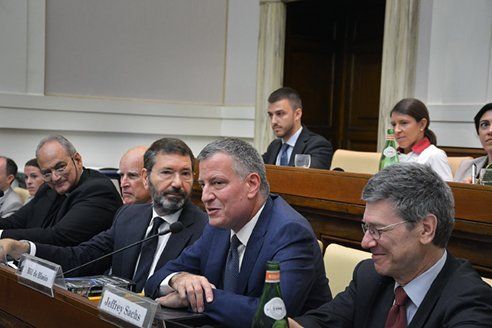Casina Pio IV, Vatican City—The Blue Chip Foundation, represented by founder Jennifer Stengaard Gross, was part of a special symposium hosted by the Pontifical Academy of Social Sciences and the United Nations’ Sustainable Development Solutions Network July 22. The symposium’s goals: to eradicate poverty while protecting human dignity, reach a state of shared prosperity that involves decent, fair jobs for all, and protect the planet by slowing climate change.
Today, 50 percent of the world’s 7 billion people live in cities, and, by 2050, experts say that around 70 percent of the global population will live in urban environments. Cities are typically a hotbed of extreme deprivation and environmental degradation, despite approximately 75 percent of global economic activity originating in these areas. As the urban population grows, so will the urban share of global GDP and investments.
“Roughly 75 percent of global economic activity is urban. We really need to involve mayors and other local leaders to face the challenges of social exclusion, economic development, and environmental preservation,” says Gross. “Cities are making commitments to decreasing carbon emissions, which is essential in the overall battle against climate change. That’s where local leaders come in – they’re the keys to implementing global change beginning in urban environments.”
Panelists at the symposium included mayors from cities all over the world, including those in Brazil, Nigeria, the U.S. and U.K., and several other nations. New York City Mayor Bill de Blasio and Oakland, Calif. Mayor Jerry Brown also attended the meeting.
Organizers from the Pontifical Academy of Social Scientists encouraged attendees to share and foster ideas on tackling human-induced climate change and the social blight of human trafficking, modern slavery, and other forms of exploitation.
“At the symposium, Pope Francis called on mayors and other community leaders to take leadership in overcoming these major challenges,” says Gross. “Part of the discussion revolved around human trafficking, forced labor, prostitution, and organ trafficking, and I think those are each unique issues that, when addressed on a small scale, are going to make a much larger difference on the world’s stage. It is our duty to protect the marginalized.”
Pope Francis called for joint action in Laudato Si’, writing, “Interdependence obliges us to think of one world with a common plan. Yet the same ingenuity which has brought about enormous technological progress has so far proved incapable of finding effective ways of dealing with grave environmental and social problems worldwide. A global consensus is essential for confronting the deeper problems, which cannot be resolved by unilateral actions on the part of individual countries.”
The Sustainable Development Goals Urban Alliance has several objectives, according to its statement, including:
- Helping cities achieve the SDGs
- Urging national and state governments to allow and facilitate cities to fulfill these
- responsibilities
- Cutting corruption that undermines sustainable development
- Engaging citizens and businesses to ensure people understand the SDGs
- Identifying pathways to decarbonize the energy system, with the ultimate goal being to prevent
- global warming from increasing beyond 2 degrees C
- Strengthening universities across the world to help them become innovation hubs for
- sustainable development
- Ending human trafficking and all forms of modern slavery
- Partnering with UN-Habitat to promote the success of Habitat III in Quito during 2016
“This is a big responsibility,” says Gross. “It’s impossible to achieve at a global level without hyper-local participation across the world’s cities. Cities are the places where sustainable development will succeed or fail – and it’s this group’s mission to ensure that it succeeds.”

